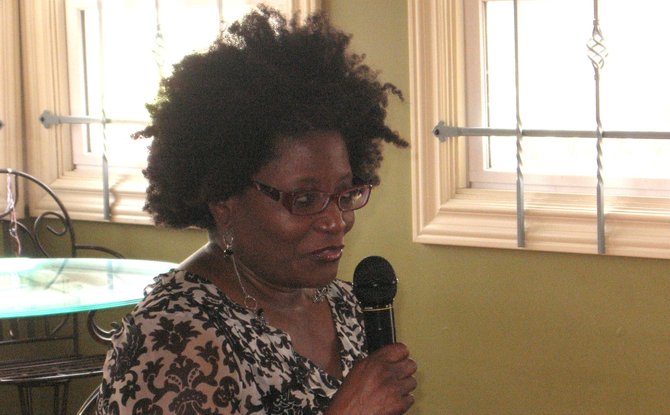Pam Shaw, a consultant with the Alliance for Early Success, spoke at the Koinonia Coffee House Friday Forum about the need for policy makers, communities and parents to collaborate and adopt long-term thinking to ensure the future of the state's children. Photo by Elizabeth Waibel.
When it comes to Mississippi's future—economically and socially—we have no better way to ensure success than to provide our youngest citizens with early childhood education, beginning at age 3.
That was the topic of conversation this morning at the Koinonia Coffee House Friday Forum. Pam Shaw, a consultant with the Alliance for Early Success, spoke passionately about the need for policy makers, communities and parents to collaborate and adopt long-term thinking to ensure the future of the state's children.
"I'm clear that when we make policy decisions that we don't think of the future, and we don't learn from the past," Shaw said.
Brain research in recent years indicates that what a child learns in the first three years of life is one of the most important indicators of future success. "I'm not making that up," Shaw said. Economists, educators and scientists have vetted the research and found that it holds up.
Shaw said that her conversations with Jackson and state leaders, including Jackson Public Schools Superintendent Cedrick Gray and Mississippi Department of Corrections Commissioner Christopher Epps, have all pointed to the same conclusion. Whether it's addressing high-school dropout rates of young black men in the capital city or high crime and incarceration rates throughout Mississippi, people point to quality pre-kindergarten programs as a potential solution, she said.
Equally important, Shaw indicated, is ensuring that parents understand the importance of early learning.
"Many of us come from homes where parents don't read to their children," she said.
It's also true that young parents are often too stressed, whether by lack of money, knowledge or time, to engage with naturally curious children in meaningful ways. Shaw said that she takes every opportunity to talk to children, even in the grocery store where she has introduced youngsters to unusual foods such as kiwis—with a mom or dad's permission, of course.
"We, as a community, have to be intentional and cognizant on how we engage" with children and their parents, she said, and leading by example is the best way to create understanding.
Shaw also said that educators should see the "third-grade gate," legislation pushed by Gov. Phil Bryant during the last session, as an opportunity. The law says that children who aren't reading at grade level by the end of third grade cannot be promoted. "Third-grade gate sounds like something to stop you," she said, instead of being viewed as an incentive to get children's skills up to appropriate grade levels. Shaw said that it's a step in the right direction, even if it's viewed punitively. "It's a change, but it's a good thing."
Children that grow up in poor households are hampered by a limited vocabulary, Shaw said. That "word gap" can reach as high as a 30-million word deficit by age 5, one audience member added later. The landmark 1995 Hart-Risely study indicated that the cumulative 30-million word gap between children raised in poverty and those raised in middle-class professional households may actually occur by age 3.
Importantly, Shaw indicated that the research and legislation are forcing a different type of conversation about the value of early learning. Individuals, community organizations, businesses, nonprofits and governmental entities are all increasingly engaged in ensuring quality education. Though Mississippians may not have done a good job creating community in the past, she said, this is an issue that affects everyone, from neighborhoods to workplaces to future economic development.
"We have to use what we have," she said. "... It's the little actions—the big one's, too—that can make a difference."
Education must become a priority in Mississippi, Shaw said. It's in everyone's best interest that all of us do well, and it begins with each of our individual actions.
"When you see a child, see yourself," she said.


